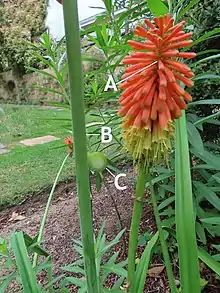Terete
Terete is a term in botany used to describe a cross section that is circular, or like a distorted circle, with a single surface wrapping around it.[1] This is usually contrasted with cross-sections that are flattened, with a distinct upper surface that is different from the lower surface. The cross-section of a branch in a tree is somewhat round, so the branch is terete. The cross section of a normal leaf has an upper surface, and a lower surface, so the leaf is not terete. However, the fleshy leaves of succulents are sometimes terete. Fruticose lichens are terete, with a roughly circular cross section and a single wrap-around skin-like surface called the cortex, compared to foliose lichens and crustose lichens, which have a flattened cross section with an upper surface that is distinct from the lower surface.[1]

Plants and lichens may also be described as subterete, meaning that they are not completely terete.